As our beloved pets age, their care and attention needs change. It is essential for pet owners to adapt their strategies to ensure the well-being and happiness of their senior pets. In this section, I will explore various aspects of caring for older pets, including when they are considered seniors, the importance of proper nutrition and weight management, the role of exercise in maintaining their health, and the significance of regular veterinary check-ups. By implementing these strategies, you can provide the best possible care for your aging pet.
Key Takeaways:
- Understanding when your pet enters the senior stage is crucial for tailoring their care appropriately.
- Proper nutrition and weight management play a significant role in maintaining the health of aging pets.
- Regular exercise, tailored to their abilities, helps senior pets maintain muscle tone and overall well-being.
- Mental stimulation is necessary to prevent cognitive decline in older pets.
- Regular grooming and creating a comfortable home environment are essential for the comfort and safety of senior pets.
When Does “Senior” Start for Pets?
When it comes to determining when a pet enters their senior years, there are several factors to consider. While the age at which a pet is considered a senior can vary depending on their breed and size, it typically ranges from 5 to 9 years. Smaller dog breeds, such as Chihuahuas and Toy Poodles, may be considered seniors around 7-9 years of age. On the other hand, larger breeds, like Great Danes and Saint Bernards, may reach their senior stage sooner, around 5-7 years.
However, it’s important to note that individual factors can also influence when a pet transitions into their golden years. Genetics, overall health, and lifestyle play significant roles in determining the onset of senior status. Some pets may show signs of aging earlier or later than the average age range for their breed. Therefore, it’s essential for pet owners to closely observe their pets and work in partnership with their veterinarian to identify when their furry friends cross the threshold into their senior phase of life.
Regular check-ups and consultations with a trusted veterinarian can provide valuable insights into an individual pet’s health and aging process. By monitoring their pet’s overall well-being, observing any changes in behavior or physical appearance, and discussing these findings with a veterinarian, pet owners can gain a better understanding of when their pets start their senior journey.
Here’s an image that showcases the aging process in pets:
Proper Nutrition for Aging Pets
As our pets age, their nutritional needs change, and providing them with proper nutrition becomes increasingly important. Aging pets often experience a slowed metabolism and reduced activity levels, which can lead to weight gain and associated health issues. Optimal nutrition plays a crucial role in maintaining their overall health and well-being.
One of the key considerations for feeding older pets is ensuring that their diet is complete and balanced. This means providing them with all the essential nutrients they need, including proteins, carbohydrates, fats, vitamins, and minerals. A well-rounded diet promotes healthy bodily functions, supports the immune system, and aids in the prevention of age-related illnesses.
When it comes to choosing the right food for your aging pet, there are senior-specific options available in the market. These foods are specially formulated to meet the unique nutritional needs of older pets. They typically contain higher levels of antioxidants, joint-supporting ingredients, and lower calorie content to help prevent weight gain. Consulting with a veterinarian is crucial in determining if senior-specific pet food is appropriate for your furry friend.
Feeding guidelines for older pets may vary depending on their individual needs, size, and health condition. It’s important to carefully read and follow the instructions on pet food packaging or consult your veterinarian for personalized advice.
To provide a more comprehensive guide to nutrition for aging pets, see the table below:
| Nutritional Components | Importance | Sources |
|---|---|---|
| Proteins | Essential for muscle maintenance, repair, and overall body functions. | High-quality animal proteins such as chicken, turkey, fish, and lamb |
| Fats | Provide energy, support organ function, and aid nutrient absorption. | Omega-3 and Omega-6 fatty acids from sources like fish oil and flaxseed |
| Carbohydrates | Supply energy and aid digestion. | Whole grains, fruits, and vegetables |
| Vitamins and Minerals | Support the immune system, promote cell function, and maintain overall health. | Varied diet including fruits, vegetables, and fortified pet foods |
| Antioxidants | Protect against cellular damage and promote healthy aging. | Blueberries, cranberries, and vitamin E supplements |
Remember, nutritional needs may vary from pet to pet, so it’s essential to monitor your furry friend’s weight, energy levels, and overall health. Regularly evaluate their diet and discuss any concerns with your veterinarian to ensure they continue to thrive in their senior years.
The Importance of Exercise for Senior Pets
While the exercise requirements for senior pets may decrease compared to their younger years, it’s still important to provide them with daily opportunities for movement. Regular exercise plays a vital role in maintaining muscle tone, joint flexibility, and overall well-being in older dogs. Not only does it help them physically, but it also has psychological and emotional benefits.
Low-impact exercises such as walking, swimming, or gentle play are ideal for senior pets. These activities help to keep their muscles engaged and their joints mobile, reducing the risk of stiffness and discomfort. The keyword here is “exercise for senior pets”.
It’s important to adjust the intensity and duration of exercise according to your pet’s limitations. Every pet is different, and what may be appropriate for one may not be suitable for another. Pay attention to any signs of fatigue or discomfort during exercise and make adjustments accordingly.
To provide the best exercise program for your senior pet, consult with a veterinarian or rehabilitation specialist. They can evaluate your pet’s current condition and recommend additional exercises tailored to their specific needs. This can include stretching exercises, balance exercises, or targeted activities to address any specific health issues.
| Exercise Tips for Senior Pets | |
|---|---|
| 1. Provide daily opportunities for exercise | |
| 2. Choose low-impact exercises | |
| 3. Adjust intensity and duration based on your pet’s limitations | |
| 4. Monitor for signs of fatigue or discomfort | |
| 5. Consult with a veterinarian or rehabilitation specialist for personalized recommendations |
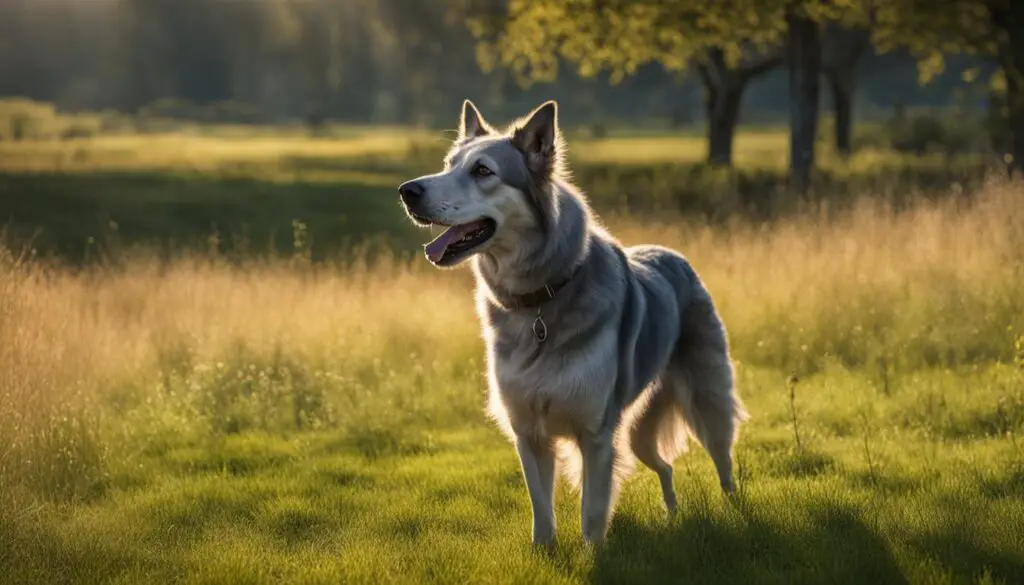
Mental Stimulation for Older Pets
Mental stimulation is just as important for senior pets as physical exercise. Engaging their minds can help prevent cognitive decline and keep them mentally sharp. Here are some ways to provide mental stimulation for your aging pet:
- Take them on different routes during walks to provide new smells and sights.
- Allow them to explore new locations, such as parks or nature trails.
- Offer interactive toys that require problem-solving skills, such as puzzle feeders.
- Provide chew toys that help keep their jaws and minds busy.
- Arrange playdates with dogs of similar age and activity level to promote socialization.
In addition to these activities, continued training and obedience exercises can strengthen the bond between you and your pet while providing mental stimulation. Teaching new tricks or practicing familiar commands with rewards can be fun for both of you.
The Benefits of Mental Stimulation for Senior Dogs
Mental stimulation for senior dogs offers numerous benefits:
- Keeps their minds active and reduces the risk of cognitive decline.
- Prevents boredom and potentially destructive behaviors.
- Helps alleviate anxiety and stress.
- Improves overall mental well-being and happiness.
“Mental stimulation is an essential aspect of senior pet care. Engaging their minds through various activities and socialization can greatly enhance their quality of life.” – Dr. Amanda Smith, Senior Veterinary Specialist
Regular Grooming and Home Comfort for Senior Pets
Regular grooming is essential for senior pets to maintain healthy skin, fur, and nails. It not only keeps them looking their best but also plays a crucial role in their overall well-being. Grooming sessions provide an opportunity to detect any abnormalities in their physical condition, such as lumps, bumps, or skin irritations, which can be addressed promptly with the help of a veterinarian.
As pets age, they may require certain adjustments in their living environment to ensure maximum comfort. Some simple modifications can go a long way in providing a safe and cozy space for your aging pet.
Creating a Comfortable Home Environment
- Consider providing raised food and water bowls to ease any discomfort that may arise from bending down to eat or drink. This can help prevent strain on their neck and back.
- Invest in a comfortable and supportive bed that offers relief for achy joints and promotes better sleep. Orthopedic beds or memory foam mattresses can be particularly beneficial for senior pets.
- If your pet has difficulty accessing furniture due to mobility issues, consider using ramps or steps to help them navigate and join you on the couch or bed. This will allow them to continue enjoying their favorite cozy spots without causing them unnecessary strain.
- To prevent slips and falls, especially on slippery floors, place rugs or mats in areas where your pet spends the most time. These will provide a non-slip surface and give them better stability while moving around the house.
Grooming Tips for Senior Pets
Grooming routines may need to be adjusted as pets age. Here are some essential grooming tips to keep in mind:
- Brush your pet regularly to help remove loose fur, prevent matting, and distribute natural oils that keep their coat healthy and shiny. Use a brush suitable for their specific fur type.
- Trim their nails regularly to prevent discomfort, potential injuries, and difficulties in walking. If you are uncomfortable with nail trimming or unsure about the process, consult a professional groomer or your veterinarian.
- Keep an eye on your pet’s dental health. Dental problems can become more common as pets age, leading to pain and other health issues. Regular brushing or the use of dental treats recommended by your veterinarian can help maintain good oral hygiene.
- Regularly check your pet’s ears for any signs of infection, redness, or excessive wax buildup. Cleaning their ears with a veterinarian-approved solution can help prevent infections and promote ear health.
- Consult with your veterinarian for any specific grooming needs your senior pet may have based on their breed, health condition, or individual requirements.
| Grooming Tip | Benefit |
|---|---|
| Regular brushing | Removes loose fur and prevents matting |
| Trimming nails | Prevents discomfort and potential injuries |
| Maintaining dental health | Prevents dental issues and promotes overall health |
| Checking ears regularly | Prevents ear infections and promotes ear health |
By maintaining a regular grooming routine and creating a comfortable home environment for your aging pet, you can help them navigate the challenges of old age with ease and ensure their well-being. Remember, each pet is unique, so consult with your veterinarian for personalized advice tailored to your senior pet’s specific needs.
Regular Veterinary Check-ups for Senior Pets
Regular veterinary check-ups are crucial for the health and well-being of our senior pets. As pets age, their bodies undergo various changes, making it important to monitor their health closely and detect any potential issues early on. By scheduling semi-annual visits to the vet, pet owners can ensure that their senior pets receive the necessary care and attention they need.
During these check-ups, veterinarians perform comprehensive physical examinations to assess the overall health of senior pets. This includes examining their weight, skin, coat, eyes, ears, teeth, and joints. By closely examining these areas, veterinarians can identify any potential signs of health problems or age-related changes that require attention.
Additionally, laboratory testing may be recommended during these check-ups to assess a senior pet’s internal health. This may include blood work, urinalysis, and other diagnostic tests to evaluate organ function, detect underlying diseases, and monitor any ongoing conditions. These tests can provide valuable insights into a pet’s overall health and help veterinarians make informed decisions regarding their care.
Furthermore, regular veterinary check-ups for senior pets provide an opportunity for pet owners to discuss any changes they have observed in their pet’s activity and behavior. This open communication allows veterinarians to gain a better understanding of a senior pet’s specific needs and concerns. Pet owners can share information about any changes in appetite, energy levels, mobility, or behavior, helping veterinarians tailor their care and provide appropriate guidance.
By following the recommendations of veterinarians and scheduling regular check-ups for senior pets, pet owners can ensure that their furry companions receive comprehensive care as they age. These check-ups play a crucial role in maintaining the health and well-being of senior pets, helping them live comfortable and fulfilling lives in their golden years.
Conclusion
Caring for older pets requires adapting to their age-related changes and providing them with the necessary support for a happy and healthy life. By following the strategies discussed in this article, such as proper nutrition, exercise, mental stimulation, regular grooming, and veterinary check-ups, you can help your senior pet maintain their health and well-being.
As with humans, older pets may experience age-related health issues, but with proactive care, you can maximize their quality of life in their golden years. Ensuring they receive a balanced and nutritious diet, tailored to their changing nutritional needs, will promote overall well-being and help prevent diseases associated with weight gain. Regular exercise, even in a modified form, will maintain muscle tone and joint flexibility.
Mental stimulation is equally important for older pets as it helps prevent cognitive decline and keeps their minds active. Using interactive toys and engaging them in different environments will keep them mentally sharp. Regular grooming ensures their comfort and helps detect any physical abnormalities. Lastly, prioritizing regular veterinary check-ups will enable early detection and proper management of any health issues that may arise.
FAQ
When should my pet be considered a senior?
The age at which a pet is considered a senior can vary depending on their breed and size. Smaller dog breeds may be considered seniors around 7-9 years of age, while larger breeds may reach their senior years sooner, around 5-7 years. However, individual factors such as genetics and overall health also play a role in determining when a pet enters their senior stage. It’s important for pet owners to work closely with their veterinarian to determine when their pet reaches the golden years.
How important is proper nutrition for aging pets?
Proper nutrition is crucial for maintaining the health of aging pets. As pets age, their metabolism slows down and they may become less active, making them prone to weight gain. Overweight pets are more susceptible to diseases such as arthritis, heart issues, and diabetes. Feeding them a complete and balanced diet that supports their changing nutritional needs is important. Consult with a veterinarian to determine if senior-specific pet food is recommended for your aging pet.
What role does exercise play in maintaining the health of senior pets?
While the exercise requirements for senior pets may decrease compared to their younger years, it’s still important to provide them with daily opportunities for movement. Low-impact exercises such as walking, swimming, or gentle play can help maintain muscle tone, joint flexibility, and overall well-being in older pets. Adjust the intensity and duration of exercise according to your pet’s limitations. Consult with a veterinarian or rehabilitation specialist for additional exercise recommendations tailored to your pet’s needs.
How can I provide mental stimulation for my older pet?
Mental stimulation is equally important for older pets as physical exercise. Engaging their minds can help prevent cognitive decline and keep them mentally sharp. Take your older pet on different routes during walks, allow them to explore new locations, and offer interactive toys that require problem-solving skills. Socialization with dogs of similar age and activity level can also be beneficial. Additionally, continued training and obedience exercises strengthen the bond between you and your pet while providing mental stimulation.
How important is regular grooming and home comfort for senior pets?
Regular grooming is essential for senior pets to maintain healthy skin, fur, and nails. It can also help detect any abnormalities in their physical condition. As pets age, they may benefit from raised food and water bowls, comfortable bedding, ramps or steps for easier access to furniture, and rugs or mats to provide a non-slip surface on slippery floors. Adjust your home environment to accommodate your aging pet’s changing needs and ensure their comfort and safety.
Why are regular veterinary check-ups crucial for senior pets?
Regular veterinary check-ups are crucial for senior pets to monitor their health and detect any potential issues early on. Senior pets should have semi-annual visits to the vet, as health examinations become more important as pets age. These check-ups may include complete physical examinations, laboratory testing, and discussions about any changes in your pet’s activity and behavior. Follow the recommendations of your veterinarian to ensure comprehensive care for your senior pet.

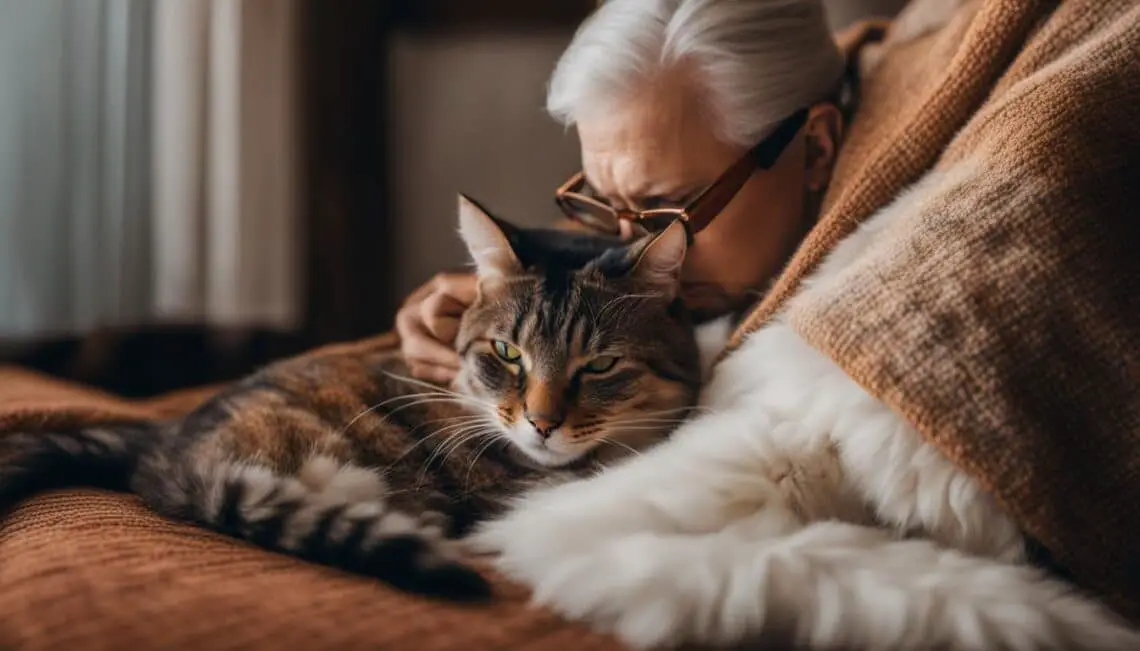
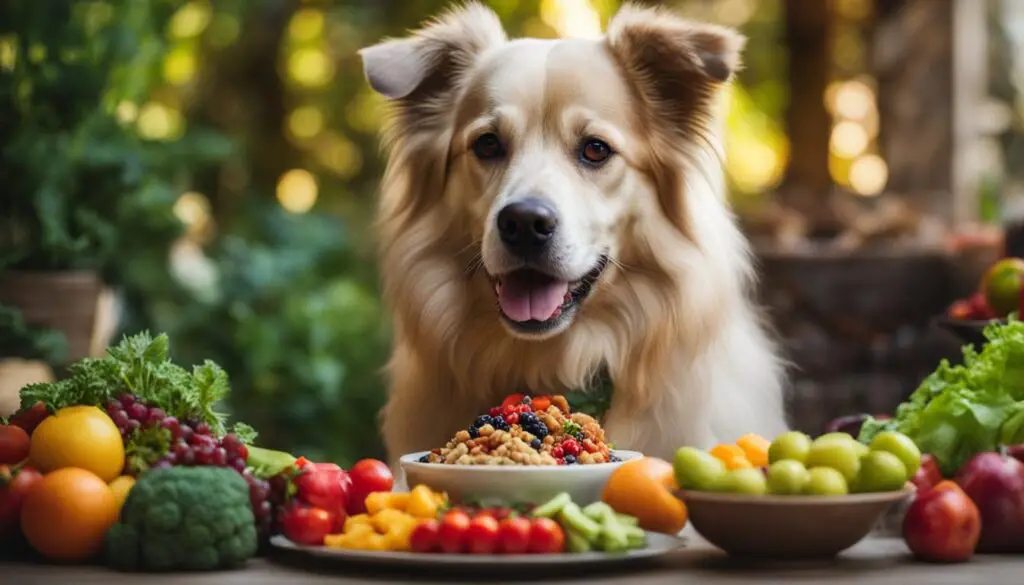
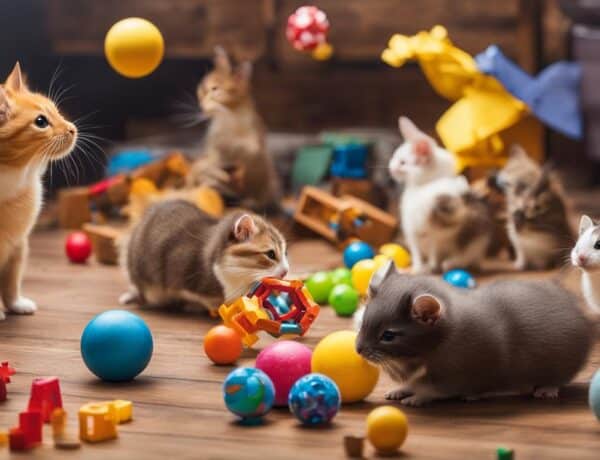
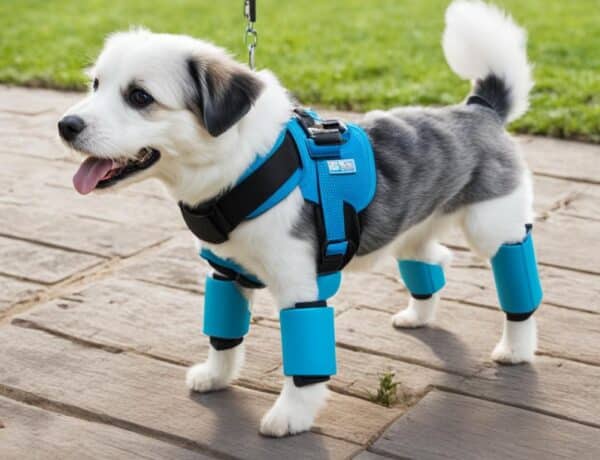

No Comments